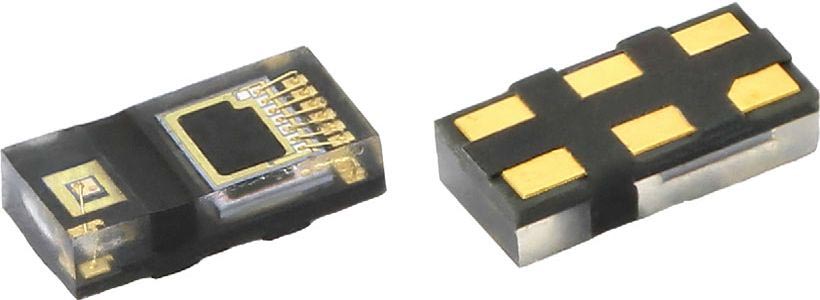Featuring a VCSEL and smart dual I2C slave address, device is ideal for battery-powered consumer applications, including TWS earphones and VR/AR headsets
The Optoelectronics group of Vishay Intertechnology introduced a new fully integrated proximity sensor designed to increase efficiency and performance in consumer applications. Featuring a vertical-cavity surface-emitting laser (VCSEL), the Vishay Semiconductors VCNL36828P combines a photodiode, application-specific integrated circuit (ASIC), 16-bit ADC, and smart dual I2C slave address in a compact 2.0 mm by 1.0 mm by 0.5 mm surface-mount package.

Compared to previous-generation solutions, the proximity sensor released today offers a 20% smaller package, 20% lower idle current of 5 μA, and 40% higher sunlight cancellation up to 140 klx. With a range of 200 mm and a typical rated supply voltage of 1.8 V, the device is designed to deliver superior proximity detection while reducing power consumption to increase efficiency in space-constrained, battery-powered applications.
The proximity sensor will be used in smartphones and smart watches for automatic screen wake-up and turn-off functions, in addition to detecting if users are wearing or not wearing true wireless stereo (TWS) earphones, virtual reality / augmented reality (VR/AR) headsets, and smart glasses. To lower costs in these applications, the VCNL36828P’s smart dual I2C slave address allows for the connection of two proximity sensors without the need for a multiplexer.
The device offers a programmable interrupt function that allows designers to specify high and low thresholds to reduce continuous communication with the microcontroller. The VCNL36828P uses intelligent cancellation to reduce cross-talk, while a smart persistence scheme ensures accurate sensing and a faster response time. The VCSEL wavelength peaks at 940 nm and has no visible “red-tail.” The sensor is RoHS-compliant, halogen-free, and Vishay Green.
Samples and production quantities of the VCNL36828P are available now, with lead times of 14 weeks.
